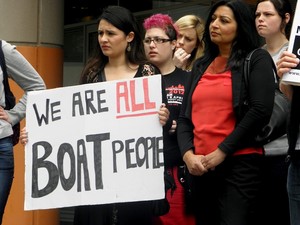
Jay Fletcher, Green Left Weekly
ANALYSIS: SYDNEY (Green Left Weekly / Pacific Media Watch): The 157 Tamil refugees who refused “a very good” deal to be deported to India now face the orchestrated despair of detention on Nauru.
The refugees were delivered to Nauru on August 2 without the knowledge of their lawyers and reportedly showing “clear signs of manhandling and trauma”.
Human rights lawyer George Newhouse said he had “not had the opportunity to inform our clients of their rights and options.
“These people were trafficked under the cover of darkness … They've been taken on the high seas, held prisoner for a month then shipped around to Cocos Islands, then the Curtin detention centre, and now in the middle of the night taken to another place.”
It is obvious that Immigration Minister Scott Morrison had them sent to Nauru to keep them from their lawyers and any criticism of the due process consistently denied to the group. But now that they are on Nauru there is reason to be gravely concerned about their future.
Harsh conditions
The offshore detention centres on Nauru and Manus Island, Papua New Guinea, are built on a system specifically designed to mentally and physically break people. That is their purpose.
On Nauru, this system revolves around the desolate and humiliating conditions in the camp, coupled with a long and arduous claim process. Both these conditions were set up by Australia.
It built a camp out of tents and inadequate facilities to create misery, and outsourced the assessment of refugee claims to the inexperienced and under-resourced government of Nauru to drag out their uncertainty.
It is the same on Manus Island. Dr Peter Young summed up exactly why the offshore camps are designed this way: the detention regime is “deliberately harsh to coerce people to return home”.
Dr Young was the Director of Mental Health for International Health and Medical Services, which holds the medical contract for all of Australia's detention centres. He told The Guardian there was clear evidence that the detention centres had the “characteristics which over time reliably cause harm to people's mental health”.
Professors Suvendrini Perera and Joseph Pugliese wrote for The Conversation on August 4: “Whereas people smugglers have no interest in intentionally harming the passengers they ferry to Australia, the state’s trafficking of refugees across borders to detain them in Pacific camps aims to cause them the greatest possible distress, and knowingly exposes them to higher probabilities of risk, violence, abuse and trauma.
“Rather than 'No Advantage', the government's own business model relies on its capacity to inflict maximum disadvantage.”
Australia's detention centres are still “factories for producing mental illness”, as Australian of the Year Patrick McGorry described them in 2010. The only difference is they are now much worse, with Nauru and Manus Island at the most extreme end of pitiless punishment.
No future
Some refugees who have been found to be genuine and released into the Nauru community — the only place for them to go now under Australia's policy to settle no refugees — have been interviewed about their situation.
In interviews released by ABC Online, two women spoke hopefully about starting a new life and finishing the studies they abandoned when they fled their home countries.
Others have reportedly said they are doing better because they are “not in prison anymore”.
But others remain in horrific conditions, and they too have broken their silence. In a letter signed by more than 50 men, who have been found to be genuine refugees and “settled” on Nauru, the reality behind Australia's treatment of people to whom it owes protection becomes clear.
The men wrote: “Here the future is not a word. It does not exist.
“We are living in a camp in the jungle. This is where they ‘resettled’ us. This is no place to live. If we are refugees why are we not living in community? We have no neighbours here. Our ‘neighbours’, our ‘relatives’ are mosquitoes and flies and dogs.
“In our country the Taliban will come onto the bus and they will slash our throat and finish your life. It will take maybe 10 or 15 minutes for us to die. But the English-Australian men are killing us by pain, taking our soul and our life slowly. This is mental torture and soon all of us will be mad. This is too much pain. We need freedom from this torture.”
Children at risk
The group of 157 Tamils included about 50 children. An ongoing investigation by the Human Rights Commission is hearing shocking testimony about the effects of Australia's mandatory detention of children.
The commission's president, Gillian Triggs, said that children have been cutting themselves, swallowing detergents, putting plastic bags over their heads, and trying to hang themselves. She said it was common to see children compulsively banging their heads on hard surfaces.
Morrison called the testimonies “troubling” but his government is all too aware of the torture it is inflicting on men, women and children.
The 157 Tamils, who dared defy Australia's “no boats” policy and refused to go away quietly, have now been sent to a place carefully cultivated to hide, deprive and punish.
This government is at pains to prove just how harsh it can be, and it shows no signs of slowing its destructive drive against refugees.
Jay Fletcher lives in Sydney and has worked at Green Left Weekly for four years, combining her journalism degree with long-term activism. She has been GLW's refugee rights reporter for three years, and has been published by New Matilda, Counter Currents, Links International Journal of Socialist Renewal and many refugee rights networks.
This work is licensed under a Creative Commons Attribution-NonCommercial 3.0 New Zealand Licence.




